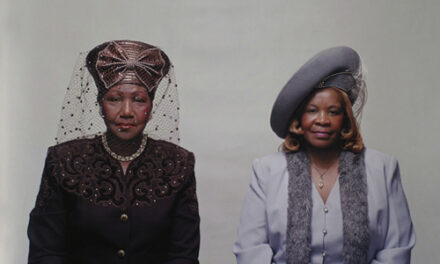Any production in January or February tempts the weather gods for interference, and that was the case this time. The original date for the opening of Doubt: A Parable at Lee Street Theatre was Thursday January 19, but our big snowstorm snuffed out that night’s activities.
Doubt, written by John Patrick Shanley, was the basis of a well-received movie in 2008 starring Meryl Streep and Philip Seymour Hoffman, which will be the way most of the audience would know about the play. Set in 1964, the subjects of racial and ethnic tension, and sexual abuse by priests, are much with us today. I recommend a look at the script, which you can read online. The play and movie have garnered many awards and much critical acclaim.
This production is by the St. Thomas Players, who are a part of the Center for Faith & the Arts. Director Claudia Galup opened the proceedings with a brief talk. This play is well-suited to small theatre groups as there are only four parts, simple costumes and props, and no need for set changes. Father Brendan Flynn was performed by Bill Reilly, a veteran of two previous Lee Street plays. He also works with XOXO in Charlotte, Three Bone Theatre, Davidson Community Players, and the Warehouse Performing Arts Center. Sister Alysius Beauvier’s role was taken on by Becky Lippard, who bears a remarkable resemblance to Queen Victoria, which helped with the imperious bearing of her character. Sister James was performed by Emma Rose. Miller was played by Lillie Oden, making her debut with Lee Street Theatre, though she has extensive acting experience, having won a Metrolina Theatre Association Award as Best Actress in a Drama.
The play opens with Father Flynn giving a sermon about doubt, complete with a rather grizzly parable about a shipwreck survivor clinging to life. This dramatic story rather sets the mood, although the play does have some sparks of humor here and there. Next, we meet Sister Alysius, or as Catholic school kids would say, Atilla the Nun. She disapproves of ballpoint pens (which, much to her irritation, Father Flynn uses to jot notes for a future sermon about intolerance!), Frosty the Snowman, secular music, boys, ice cream, wine, and pretty much anything enjoyable and fun. This goes with the set décor, which includes two rather gory crucifixes. She had her bit of worldly life some years before, but lost her husband fighting in Italy in The War. Her lowly place in the Catholic hierarchy, where being female is not to one’s advantage, clearly irks her in ways she can only address in a sideways fashion. Years of dealing with fractious working-class students, divided ethnically between Irish and Italians, did not mellow her attitude.
The meat of the matter starts when Sister James comes to Sister Alysius’ office to report that she saw Father Flynn take the only African American student at the school to the rectory, and when the student came back to class, he was depressed, and smelled of wine. Sister Alysius became suspicious immediately of abuse; Father Flynn had been transferred from other parishes several times in the last few years. The rest of the play takes this topic on – I don’t want to spoil the storyline, as it is quite simple and straightforward. The main issues are the lack of direct evidence, the reliance on suspicion and character judgement, and the credibility of Father Flynn’s denials and counter story. Anyone who has been through a trial knows how difficult this territory can be, and in the absence of any formal due process, it becomes even more parlous.
The quality of the acting was of a fine standard; the diction was clear and, in the small space, easily understood. All the actors were believable in their roles, which given the nature of the text, was not as difficult as in some other plays. Many of us have known characters not terribly unlike the nuns and the priest, as well as the mother of the child in question.
The critical matter in the arc of the drama is in the slow evolution of tone, from a beginning of a relaxed nature, to gradually increased tension, culminating in some quite angry nun-on-priest action (so to speak). There’s a suitable denouement for decompression at the end. While there is not time in the play for a complex investigation of priestly sexual abuse, the script certainly serves to give the actors something to chew on, and for the audience to ponder. The delicate point, well managed by the actors and director, is to preserve the ambiguity and subtlety in a subject prone to strong feelings and major preconceptions. It is easy to wonder why the Catholic Church handled sexual crimes by simply shuffling priests from parish to parish, or giving them promotions; perhaps this play gives some perspective on how that could happen.
I enjoyed this production and recommend it to all in the area.
Doubt: A Parable continues through Saturday, January 27. For more details on this production, please view the sidebar.












